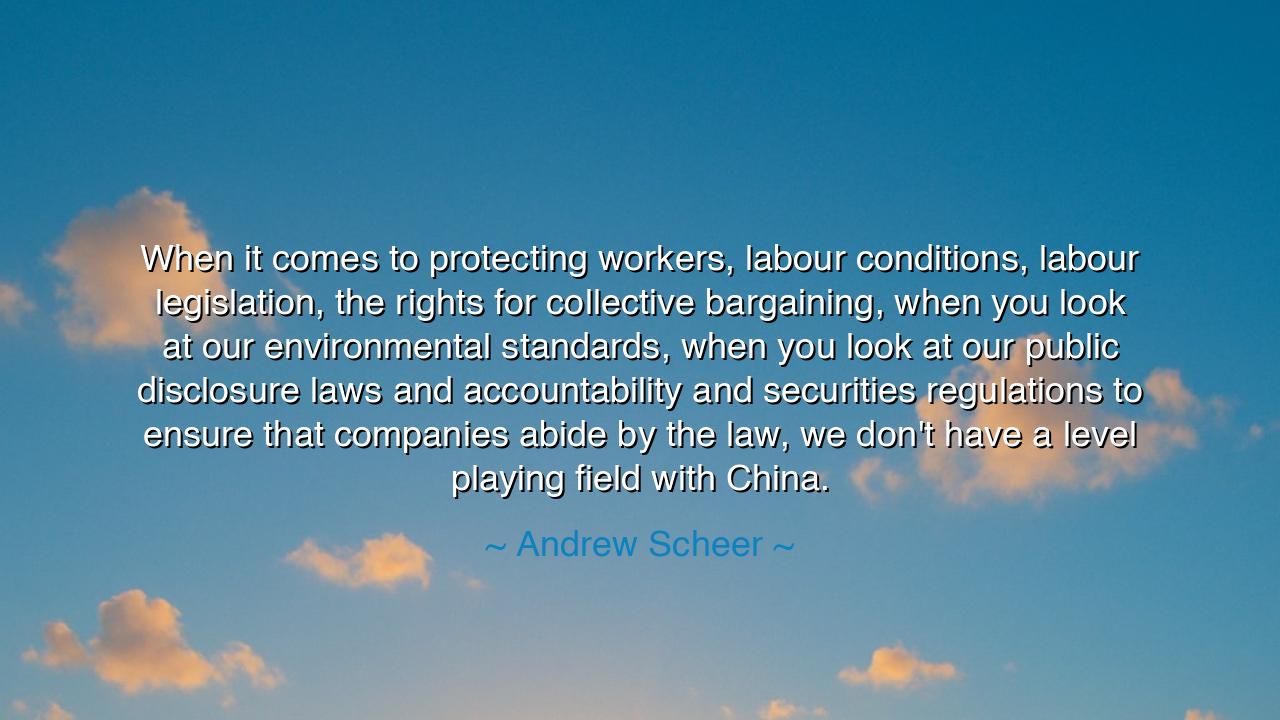
When it comes to protecting workers, labour conditions, labour
When it comes to protecting workers, labour conditions, labour legislation, the rights for collective bargaining, when you look at our environmental standards, when you look at our public disclosure laws and accountability and securities regulations to ensure that companies abide by the law, we don't have a level playing field with China.






Hear these words, O listeners, the voice of Andrew Scheer, who declared: “When it comes to protecting workers, labour conditions, labour legislation, the rights for collective bargaining, when you look at our environmental standards, when you look at our public disclosure laws and accountability and securities regulations to ensure that companies abide by the law, we don’t have a level playing field with China.” This is not merely the cry of a politician, but the lament of one who sees imbalance between nations, between those who raise the standard of justice and those who forsake it. The words resound like a drum of warning, reminding us that trade without fairness is no blessing, but a weapon that strikes at the very heart of society.
The essence of Scheer’s cry lies in the sacred duty of labour. From the sweat of workers the wealth of nations is born, and upon their shoulders rests the strength of empires. To dishonor the worker, to strip them of rights, is to build prosperity upon sand and bones. In lands where collective bargaining is silenced, where labour legislation bends to the will of power, the cost of goods is measured not in coin alone but in broken bodies and muted voices. And yet such goods, cheapened by injustice, flow across borders to compete with the honest labor of nations where standards still strive to protect dignity. Thus, there is no level playing field, but a battlefield where the just are wounded by the unjust.
Recall the lesson of the Industrial Revolution in England, when mills roared and chimneys choked the skies. There, children labored in darkness, their small fingers weaving profit while their spirits withered. It was only through the courage of reformers—such as Lord Shaftesbury, who fought for laws to end child labor—that the wheel of justice began to turn. England rose not merely on steel and coal, but on the gradual recognition that the laborer was not a machine, but a soul. This same struggle now echoes across the seas, where some lands still treat workers as expendable fuel for profit.
But Scheer’s words do not rest only upon labour; they extend to the realm of the environment. For what does it profit a nation to gain wealth if its rivers run black and its skies choke with poison? When one land embraces environmental standards, protecting the air and the water, while another abandons them, then commerce itself becomes a contest of unequals. Those who uphold responsibility are burdened, while those who scorn it gain advantage. It is as if one warrior enters battle armored in honor, while the other fights with no code, no shield, and no restraint.
The cry for public disclosure laws and accountability is a call to truth. For without regulations that bind the greedy hand, the marketplace becomes a den of wolves. A company that hides its dealings, that twists its numbers and cloaks its damage, is like a serpent in the grass, unseen until it strikes. Nations that require truth in trade and law are disadvantaged when competing against those who cloak corruption in shadows. Thus the imbalance grows, and the trust of peoples is corroded.
The lesson is clear: justice must not stop at borders. If one land honors workers, safeguards nature, and demands accountability, but another scorns these duties, the world itself becomes fractured. Fairness in trade requires fairness in values. For what good is a level playing field if it is flooded with the tears of the oppressed? True equality can never be built upon injustice, for the imbalance of one nation ripples outward to all.
What then shall we do? Let each citizen demand transparency in the goods they purchase, and let each nation strive to uphold not only its own standards, but to call others to higher ground. Support companies that honor workers; refuse those that exploit. Choose leaders who defend the environment, who demand fairness in trade, who see beyond short-term gain to long-term justice. For every coin we spend, every law we support, becomes a weapon either for oppression or for righteousness.
Thus remember Andrew Scheer’s words: the playing field is not level, but we are not powerless. Each action, each choice, each voice raised in defense of fairness adds weight to the side of justice. If we, like the reformers of old, refuse to look away from suffering, then one day the field may yet be leveled—not by the lowering of the righteous, but by the raising of the unjust into the light of accountability.






AAdministratorAdministrator
Welcome, honored guests. Please leave a comment, we will respond soon